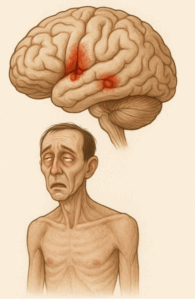Wernicke–Korsakoff Syndrome: When Thiamine Deficiency Tricks the Brain
 A Case to Begin With
A Case to Begin With
Mr. A, a 48-year-old long-time alcohol user, was brought to the emergency room confused, staggering, and with unusual eye movements. He was given glucose intravenously, after which his condition worsened dramatically. Only later was he diagnosed with Wernicke’s encephalopathy, a medical emergency caused by severe thiamine (Vitamin B1) deficiency. Months later, even though his confusion improved, he was left with severe memory problems — a chronic condition known as Korsakoff’s syndrome.
What Is Wernicke–Korsakoff Syndrome (WKS)?
-
Wernicke’s encephalopathy (acute, reversible): a triad of confusion, ataxia (unsteady gait), and eye movement abnormalities.
-
Korsakoff’s syndrome (chronic, often irreversible): severe memory loss, confabulation (fabricating stories), apathy, and poor insight.
-
Together, they form Wernicke–Korsakoff syndrome, most often linked to chronic alcoholism, but also seen in malnutrition, hyperemesis gravidarum, or bariatric surgery.
Symptoms to Recognize
-
Wernicke’s (acute):
-
Confusion, drowsiness.
-
Nystagmus, ophthalmoplegia.
-
Staggering gait, poor balance.
-
-
Korsakoff’s (chronic):
-
Anterograde amnesia (can’t form new memories).
-
Retrograde memory loss (forgetting past events).
-
Confabulation (filling memory gaps with invented details).
-
Lack of concern or apathy.
-
Why It Happens
-
Thiamine is essential for glucose metabolism in the brain.
-
In deficiency, high-energy brain areas like the mammillary bodies, thalamus, and hypothalamus are damaged.
-
Giving glucose before thiamine worsens brain injury — a classic pitfall in emergency care.
Diagnosis
-
Clinical diagnosis is key — do not wait for the full triad.
-
MRI: mammillary body atrophy, thalamic changes.
-
Caine’s criteria: diagnosis if 2 of → dietary deficiency, eye signs, cerebellar dysfunction, altered mental state/memory.
Management
-
Immediate IV thiamine: 500 mg TDS for 2–3 days, then 250 mg daily for 5 days.
-
Always give thiamine before glucose infusion.
-
Treat underlying cause: alcohol cessation, nutritional rehabilitation.
-
Long-term cognitive rehab and caregiver support for Korsakoff’s.
For Caregivers
-
Patients with Korsakoff’s may appear confident while giving false but convincing stories — this is not lying, but a memory deficit.
-
Provide structured environments, repetition, and external memory aids (notebooks, alarms).
-
Manage expectations: Korsakoff’s is often irreversible, but stability and quality of life can be improved.
Key Takeaway
Wernicke–Korsakoff Syndrome is preventable and treatable if recognized early. A simple dose of thiamine can be lifesaving. For those left with chronic Korsakoff’s, compassionate caregiving and structure make all the difference.
About the Author
Dr. Srinivas Rajkumar T
Consultant Psychiatrist
Apollo Clinic, Velachery, Chennai
📞 85951 55808